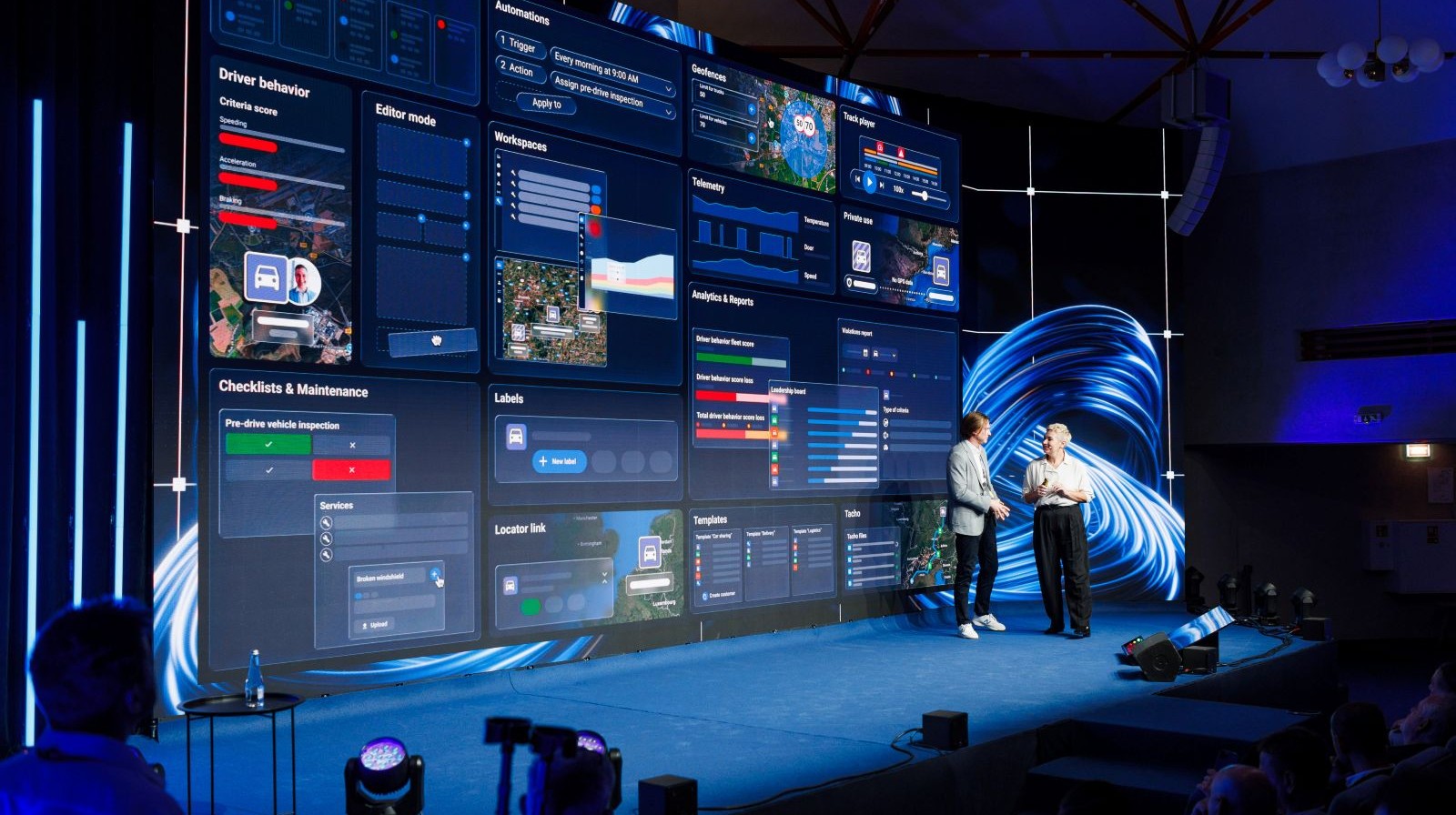The fleet management trends saw big changes in 2023, especially in AI and sustainability. What we'd long discussed finally became reality in the fleet industry.
What are we going to see in 2024? This year, the major fleet industry trends include electric vehicles, smart mobility, green fleets, and AI. Their impact on the fleet management market will be profound and far-reaching.
Let's see how these trends will shape fleet management industry in 2024.
Trend #1: The rise of generative AI in telematics
AI has been called a revolutionary tech for a while. However, it was often seen as a tool for engineers and scientists to play with in their laboratories.
ChatGPT gained significant attention by the end of 2022. Its capacity to generate coherent and contextually relevant content using large language models (LLMs) totally changed how people saw AI. The next step is multimodal AI, and it’s one of the latest trends. It should be able to go beyond text generation and create images, audio, and video.
In the fleet management market, generative AI will revolutionize telematics platforms like Wialon. During Telematics Vilnius 2023, Aliaksei Shchurko, Gurtam CEO, emphasized its key role in fleet management technology. He believes that with AI, fleet management will evolve as follows:
AI is becoming more context-aware. AI relies heavily on data for its effectiveness. While ChatGPT is great at predicting words, it usually doesn't understand the context. To address this limitation, more AI models will be trained on specific data sources, such as Wialon. With access to fleet management data from nearly 4 million connected vehicles, our platform could enable AI to provide tailored responses to fleet owners, managers, and dispatchers.
The number of AI personal assistants is on the rise. We anticipate a surge in personalized AI assistants integrated into various solutions. In 2023, Microsoft, Google, and Amazon rolled out generative AI assistants. In 2024, we expect more of these assistants providing personalized recommendations. In telematics, this could translate to an AI chatbot quickly spotting anomalies in reports or offering step-by-step guides for device setup.
AI integrates into enterprise workflows. We’ll see more of AI solving routine tasks. For example, AI telematics systems can classify driving styles, generate recommendations, and autonomously address issues captured in images. In 2024, this trend of automation and simplification will continue to grow and improve fleet operations.
For more insights into AI and its role in the future of telematics, watch Aliaksei’s keynote from Telematics Vilnius 2023:
Trend #2: More green fleet initiatives
Sustainability stands out as one of the most significant trends in fleet management. Now, governments are making big plans to reduce pollution within short timelines. In the US, while much depends on the 2024 elections, the Biden administration is currently proposing stringent rules to transition most new cars and some trucks to electric by 2032. Similarly, the EU is implementing regulations to prohibit the sale of gas and diesel cars by 2035.
To stay relevant in the future, companies from the fleet industry need to adjust their strategies and gradually shift towards green fleets. Telematics plays a crucial role in this process. Here's how telematics service providers can assist in implementing a green strategy while addressing automotive fleet industry trends:
Intelligent fuel management. Telematics service providers can implement fuel monitoring systems to track fuel consumption in real-time. For example, by pinpointing excessive idling or inefficient routes, they help fleet managers take corrective actions, like route optimization or driver training.
Vehicle fleet maintenance optimization. Telematics platforms analyze real-time usage and performance data to optimize maintenance schedules. Instead of relying on mileage or time-based schedules, these systems consider other parameters like engine diagnostics and fluid levels to determine the best time for maintenance tasks. Proactive scheduling prevents breakdowns and costly repairs.
Driver behavior monitoring. Telematics systems track driver behavior, including speeding and harsh braking, in real-time. Fleet managers use this information to identify drivers who may need additional training to adopt eco-friendly driving practices. Providing feedback and incentives for safe and fuel-efficient driving helps reduce fuel consumption and improve road safety.
Autonomous fleets. Autonomous fleets rely on smart algorithms to analyze traffic and find the best routes fast, avoiding accidents. This way, they promote sustainable transport and help reduce CO2 emissions.
Each journey towards green fleet initiatives begins with small steps, and fleet management technologies can help fleet operators take these steps. You may start with measuring a fleet’s carbon footprint.
For instance, Wialon offers CO2 emission control functionality. By applying ready-to-use or customized formulas, fleets can calculate their carbon footprint through Wialon's reporting system. This feature simplifies the process, enabling fleets to effectively track and manage their environmental impact.
Trend #3: Gradual vehicle electrification
Talking about sustainability. Vehicle electrification is a major improvement in the fleet management industry and its green efforts. It helps cut emissions from road transport that currently make up over 15% of global energy-related emissions.
In recent years, electric cars have seen growth in popularity because now they can go farther, there are more models to choose from, and they perform better. As a result, in 2023, about 18% of new cars sold were electric.
Certainly, electric cars won't completely replace ICE cars in 2024. There are many reasons for it, including EV high prices, insufficient charging infrastructure, and range anxiety, or driver worry about their battery running out before they reach their destination. Still, we’ll see more fleets adopting a mix of diesel, electric, and hybrid vehicles.
Will this trend seriously affect fleet management technologies in 2024? Probably not.
Aliaksei Shchurko
Gurtam CEO
"Electric vehicles are just vehicles. Even though EVs have new features like battery levels, telematics platforms can handle these changes easily.”
That means that telematics providers won't have to change drastically how they work. The best 2024 strategy for them will be to focus on helping clients monitor both diesel and electric vehicles using a single system. As a result, we’ll see the evolution of telematics solutions to address these fleet management technology trends. Fleets may add more EV-specific features, like monitoring battery health, optimizing charging schedules, and ensuring compliance with green rules.
Trend #4: Embracing smart mobility
As one of the fleet management trends, smart mobility is closely linked to sustainability. But what is smart mobility? Essentially, it's a network where buses, taxis, scooters, and other modes of transportation use technologies to improve how people move in cities.
Smart mobility covers a wide range of solutions, including:
transparent public transportation services that stick to schedules;
efficient urban deliveries with optimized route planning;
Mobility-as-a-Service (MaaS) solutions like carpooling apps, ridesharing services, and electric scooters.
In the fleet management market trends, the popularity of smart mobility is on the rise. For instance, in developed countries, the MaaS userbase is expected to grow by 326% between 2023 and 2028, replacing 3.3 billion private car journeys. That means that in 2024, the number of smart mobility projects will continue to grow.
This will create fresh opportunities for telematics service providers. For example, a GPS tracking system like Wialon seamlessly integrates with a MaaS e-scooter application and helps locate the connected scooters, tracks their battery charge, and ensures timely recharging and repair.
For more inspiration, check out our use case library, where you'll find Wialon-based smart mobility solutions for public transportation, delivery services, and shared fleets.
Trend #5: Surge in cybersecurity risks
The fleet management industry trends highlight ransomware as a growing threat. Incidents have surged by 400% in the last 6 years. The actual number of attacks is likely much higher since many go unreported.
Any connected vehicle is at risk, whether it's a truck fleet, ride-hailing service, or school bus. After an attack, fleets incur financial losses and require additional time to recover, which increases operational costs.
A major challenge for fleets is the vulnerability of tracking devices and equipment. Many lack strong security measures, making them easy targets for cybercriminals due to their small size, affordability, and lack of built-in security features.
While some suggest switching to 5G technology for better security, it still has vulnerabilities, especially when interacting with older networks and devices. So, relying solely on 5G won’t fully protect fleets.
As experts anticipate a rise in cyberattacks on fleets in 2024, what steps can fleets take to safeguard themselves amid the evolving landscape of fleet management market trends? The answer lies in adopting reliable fleet management solutions that prioritize security.
For example, Wialon ensures security in multiple ways:
Keeping software development aligned with industry standards and best practices.
Maintaining up-to-date security patches for application servers, database servers, and client systems;
Developing custom testing and vulnerability detection tools to address specific features where standard tools fall short.
As a result of these measures, the platform remains free from critical insecurities. If a security issue ever arises, the Wialon team typically responds to it within 5 minutes.
Trend #6: Prioritizing driver safety
Telematics used to be all about keeping an eye on how drivers behaved. Back then, it was more about control and punishment rather than support.
Now, the focus is shifting towards making sure drivers stay safe and have better working conditions, especially with the shortage of drivers becoming a global problem. In 2023, there were already three million vacant truck driver jobs worldwide, and things aren't looking much better for 2024.
So, what can companies do? They can improve working conditions by using technology.
One such technology that embodies fleet management trends is Advanced Driver Assistance Systems (ADAS). ADAS brings together sensors, cameras, and GPS to boost driver safety. It helps monitor driver fatigue and alertness in real-time, spots potential dangers on the road, and lets vehicles communicate with each other for better awareness.
And that's just one example. AI, computer vision, and other tools are also contributing to the advancement of fleet management technology trends. They make drivers' jobs safer without making them feel constantly watched.
In Wialon’s lineup, there are many solutions designed to enhance safety and communication with drivers. Take, for instance, a solution built on OBS monitoring and video telematics, which helped ensure compliance with labor laws and driving time regulations.
Conclusion
The fleet management trends mentioned here are long-term and will continue to shape the future of fleet management in 2024. We'll see more practical applications of generative AI, EVs, and ADAS. Will your company be part of this evolution?
Aliaksandr Kuushynau
Head of Wialon
“The rise of electric vehicles, shared mobility, and the eventual integration of autonomous vehicles may seem like a distant future. But indeed, it’s just a matter of time. It's paramount for telematics service providers to evolve with the changing landscape rather than standing on the sidelines.”
Now is the perfect opportunity for ambitious businesses to distinguish themselves and prepare for changes ahead of their competitors. By embracing forward-thinking solutions like Wialon, you can lead the way in the fleet management industry.
If you have already started or are about to start the fleet management business and want to try Wialon, please contact us by filling out this form. If you want to monitor your fleet or other assets, please contact the Wialon partner in your region. Find the one that suits you best on the Wialon partner map.


.png)










